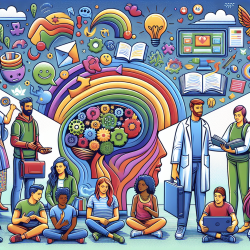Mental health literacy is a crucial component in addressing the growing rates of psychological disorders among college students. As practitioners, understanding the factors that contribute to mental health literacy can significantly enhance our ability to provide effective interventions. A recent study titled "Mental Health Literacy in a Diverse Sample of Undergraduate Students: Demographic, Psychological, and Academic Correlates" offers valuable insights into this area.
The Importance of Mental Health Literacy
Mental health literacy involves the knowledge and beliefs about psychological disorders that aid in recognizing, managing, and preventing such disorders. Improving mental health literacy can lead to early recognition and appropriate intervention for psychological issues, which is especially critical for college students who are at a vulnerable age for the onset of these disorders.
Key Findings from the Research
The study analyzed data from 1,213 undergraduate students across nine colleges within a large urban university system. It identified several factors that influence mental health literacy:
- Coursework: Students who took at least one course related to clinical psychology scored higher in mental health literacy assessments. This suggests that formal education in psychology can positively impact students' understanding of mental health issues.
- Field of Study: Majoring in psychology or applied health sciences was associated with higher mental health literacy scores compared to majors in business/economics or STEM fields.
- Demographics: Female students, those aged 28-32, and white students were more likely to have higher mental health literacy scores.
- Mental Health Experience: Students with personal or family experience with psychological disorders or those diagnosed/treated for a disorder had higher literacy scores.
Implications for Practitioners
The findings highlight the importance of integrating mental health education into college curricula. Practitioners can advocate for courses that focus on mental health literacy as part of general education requirements. Additionally, outreach programs targeting underrepresented groups such as males and minority students can help bridge the gap in mental health literacy.
The study also underscores the role of personal experience in enhancing mental health literacy. Encouraging open discussions about mental health within families and communities can foster an environment conducive to learning and understanding these issues.
Encouraging Further Research
This research provides a foundation for further exploration into how educational interventions can improve mental health literacy among diverse student populations. Practitioners are encouraged to engage in ongoing research to develop tailored strategies that address the unique needs of different student groups.
Your Role as a Practitioner
Your role extends beyond providing therapy; it involves being an advocate for educational initiatives that promote mental health awareness. By staying informed about the latest research and participating in professional development opportunities, you can enhance your practice and contribute to improving mental health outcomes for college students.










